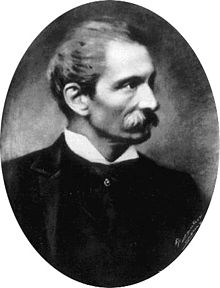Giuseppe Zanardelli
Giuseppe Zanardelli (born November 26, 1826 in Brescia , † December 26, 1903 in Maderno ) was an Italian statesman and legal advisor, and from February 15, 1901 to January 29, 1903 President of the Council of Ministers (Prime Minister).
Life
Giuseppe Zanardelli fought in the departments of volunteers in the war of 1848 , returned to Brescia after the defeat at Novara and was temporarily able to live on legal advice. Later he was persecuted by the Austrian police and because he refused to write for Austrians, he was denied the right to teach.
In 1860 he was elected as a member of the last parliament of the Kingdom of Sardinia , after which he only occupied administrative positions. It was not until 1876 that he actively devoted himself to a political career and held leading positions on the left. As Minister of Public Works in the first cabinet of Agostino Depretis in 1876 and Minister of the Interior in the cabinet of Benedetto Cairoli in 1878, he showed remarkable skills, dealing with reform of the electoral law. There was considerable disappointment with his handling of the problem of irredentism and his policy of strangling crime with violence instead of preventing it with caution. This attitude was, among other things, the motivation for a steep increase in the number of murders.
After the fall of the Cairoli government, he came back to power in December 1878 as Minister of Justice in the Depretis government in 1881 and was able to finish recording the new trading book. Adopted by Depretis in 1883, he remained in the opposition until 1887. When he returned to the Depretis government as Minister of Justice, he also held this post in the subsequent government of Francesco Crispi until January 31, 1891. During this term of office he was able to pass the new penal code and began reforming the legal system. After the overthrow of the Giovanni Giolitti cabinet , Zanardelli tried unsuccessfully to form a new cabinet in 1893.
After being elected President of the Chamber of Deputies in the 18th and 20th legislative periods in 1892 and 1897, he held this office with great ability until December 1897. Appointed Minister of Justice under the government of Antonio Starrabba , there were disagreements with his ministerial colleague Emilio Visconti-Venosta about what measures were necessary to prevent a repetition of the hunger riots of May 1898 ( moti di Milano del 1898 ). Zanardelli stepped back on it.
Re-elected President of the Chamber on November 17, 1898, he left his post and fought against the public safety bill in 1899/1900. This position secured him the support of the far left in the formation of a new cabinet after the fall of the Saracco government in February 1901. However, his poor health did not allow him to perform great works. The divorce bill, although already passed by the House of Representatives, had to be withdrawn because of popular opposition.
Giuseppe Zanardelli retired from politics on November 2, 1903 and died on December 26 of the same year.
Trivia
The famous Neapolitan song Torna a Surriento is associated with Giuseppe Zanardelli . On September 15, 1902, Zanardelli, incumbent Prime Minister, came to Sorrento . Baron Guglielmo Tramontano , the mayor of the small town who was also the owner of the hotel where Zanardelli stayed, asked the brothers Gian Battista and Ernesto De Curtis to write a song for the distinguished guest. He hoped to gain popularity with Zanardelli in order to secure the opening of a post office in Sorrento. Ernesto De Curtis took out an old melody that he had composed a few years earlier and the brother wrote off the cuff a suitable text for the occasion; this is how Torna a Surriento ('Come back to Sorrento') was born. After a few word changes, the song was sung at the Piedigrotta Festival in 1905. As a result, the popularity of this piece rose sharply until it became one of the most famous Neapolitan songs in the world.
Web links
- Entry in the Portale storico of the Camera dei deputati with further links
- Giuseppe Zanardelli , entry in the Encyclopædia Britannica 1911 (English)
Individual evidence
- ↑ It is also mentioned October 26th: detailed biography at the Camera dei Deputati, which, however, indicates November 26th in the main entry
| personal data | |
|---|---|
| SURNAME | Zanardelli, Giuseppe |
| BRIEF DESCRIPTION | Italian lawyer and statesman |
| DATE OF BIRTH | November 26, 1826 |
| PLACE OF BIRTH | Brescia |
| DATE OF DEATH | December 26, 1903 |
| Place of death | Maderno |
